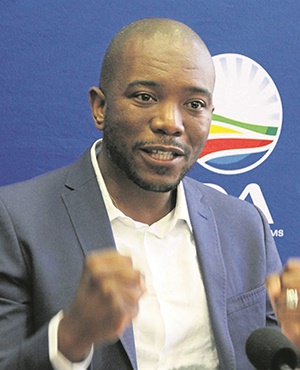With allegations of corruption in the ANC getting a public
face in the State Capture Inquiry, one would expect an effective opposition
party to take full advantage. Instead, the DA is still recovering from a series
of PR disasters that each served to erode the values many South Africans have
come to know and trust the party for – accountability, transparency and
effective governance.
With the latest Ipsos poll giving the party 13% of the national vote – significantly less than the 22.2% it won in the previous national election – the question arises whether the party will be able to claw back support in time for 2019. While some analysts reckon the 13% estimated support is drastically understated, there can be no denial that the party has taken some knocks.
Karabo Rajuili, advocacy coordinator at AmaBungane, says the DA's unwillingness to understand the importance of being publicly accountable in its decision-making could very well be its downfall.
"The manner in which they handled the Patricia de Lille saga… I think the DA is going to count the cost of that in years to come and as it does grow its support base, the complexities of the party grow as well," she said during a discussion about opposition politics at the Open Book festival in Cape Town. "Political parties fail to understand that the public trust is not a given, and that it can only be gained through being transparent about the internal dynamics of a party."
Janet Heard, managing editor of The Daily Maverick, agrees.
"The denialism from a party that holds accountability and transparency as their cornerstone values has been astounding. This might cost them votes, because if there's one thing voters hate it is hypocrisy," she said.
"I think the DA took a lot for granted in just assuming that they have the trust of the public who supported them. They weren't used to being questioned by that support base and it seemed like they couldn't believe that they were being challenged on their transparency (in dealing with the De Lille matter)."
Political analyst Ralph Mathekga adds that the ANC is under immense pressure in Gauteng and that now is the time the DA could really make a dent in their support in the province. Instead, they are struggling with issues of identity, race and management, allowing the ANC room to breathe.
There is also the matter of which individual is going to lead the DA in Gauteng, with none of its current leaders in the province being without problems.
"Going into this election everyone else is displaced by Ramaphosa. There's been a big shift in opposition politics," Mathekga said.
"The EFF makes a lot of noise but they don't believe in opposition politics, meaning it does not believe in incremental gains as an opposition in politics. They feel better when they align themselves with the governing party through majoritarianism. That changes the face of the opposition.
"The DA is the only remaining party that is not trying to work out some form of majoritarian agreement with the governing party. But it seems that if they come into government they're going to battle with the same problems as the ANC."
A major problem is that the decline of the DA will have a serious impact on opposition politics – to the detriment of society, says Mathekga.
